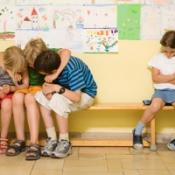 As humans, we are social animals. One consequence of this is the potential to be uncomfortable or anxious around other people. Some people are born with this tendency and labeled “shy”: these children tend to be more inhibited and fearful around people they don’t know well. If shy children are adequately encouraged and supported when they are young, they often outgrow their shyness.
As humans, we are social animals. One consequence of this is the potential to be uncomfortable or anxious around other people. Some people are born with this tendency and labeled “shy”: these children tend to be more inhibited and fearful around people they don’t know well. If shy children are adequately encouraged and supported when they are young, they often outgrow their shyness.
Adolescence is another difficult time in life for self-consciousness and discomfort with oneself. How well one fits into their peer group is of tantamount importance and affects adolescents’ growing sense of self. If all goes well, the adolescent grows into a self-confident and mature adult.
Early adulthood is the most typical time in life that people develop anxiety. Being an adult presents new stresses that people may lack adequate coping skills to deal with. Severe anxiety states may develop, along with the fear of other people noticing that anxiety. Sometimes this develops into social anxiety, which is characterized by fears of feeling embarrassed or humiliated around other people. Underlying this is the fear of being seen as weak, defective, or somehow not okay in the eyes of other people. Underlying this fear is shame.
Shame is a feeling of being flawed or unacceptable in some way. Sometimes this feeling is very vague, with people not knowing where their discomfort is coming from. Author John Bradshaw elaborates: “Guilt is the experience that you made a mistake, while shame is the experience that you are a mistake.”
Early in life, shaming experiences happen in one’s family, in school, and among peers. Shame has the adaptive function of guiding us to conform to the ethics, morals, and rules of our environment. However, negative shameful experiences cause us to feel hopeless and inadequate, and sometimes lead to depression. Generally, there are certain areas in which an individual feels lacking or flawed: personal attractiveness, intelligence, competence, and lovability are common themes.
It is almost impossible to get through childhood and adolescence without experiencing at least a few shaming experiences. It is helpful to be aware of one’s areas of shame because shame very much influences how we interact with the world. Avoidance of meeting people is a typical response of someone with social anxiety. Dependence on alcohol and drugs may also be used to numb the anxiety. For others, criticizing or ridiculing others in order to make oneself feel less inferior is another strategy. Clearly, these strategies can have very negative consequences in one’s life.
If you think that shame may influence some of your difficulties, working to transform the underlying beliefs that live inside you may be a good idea. You can continue to read about shame in books like John Bradshaw’s, talk to supportive friends, or see a counselor or therapist.

The preceding article was solely written by the author named above. Any views and opinions expressed are not necessarily shared by GoodTherapy.org. Questions or concerns about the preceding article can be directed to the author or posted as a comment below.

 How 'Should' Messages Set the Stage for Anxiety
How 'Should' Messages Set the Stage for Anxiety Self-Criticism: How Anxiety Affects Your Thoughts
Self-Criticism: How Anxiety Affects Your Thoughts Fitting In and the Development of Self
Fitting In and the Development of Self

